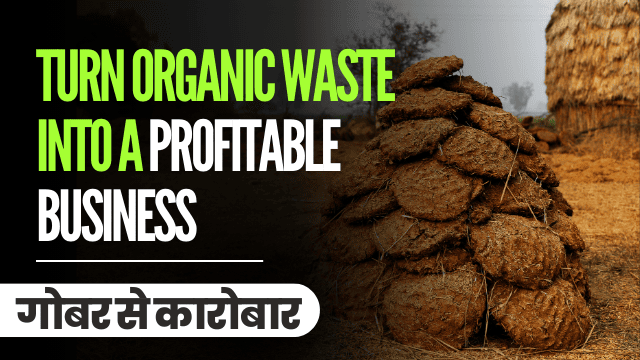In today’s world, where people are moving towards natural and sustainable lifestyles, even the most unexpected rural resources are finding new value. Cow dung is one of them.
Yes, you read that right. What was once treated as waste is now being sold online and used in farming, religious rituals, eco-friendly products, and even renewable energy. If you have access to this natural material, you might be sitting on a business opportunity that’s both eco-friendly and profitable.
Here’s a simple guide on how to start selling cow dung online and turn something humble into a smart business.
Step-1: Why Cow Dung Is in Demand – Understanding the Market Potential
Cow dung is not just a byproduct anymore.it has real value across multiple industries:
- Organic farming: Farmers prefer cow dung as a natural fertilizer and soil booster.
- Urban gardening: Garden lovers are choosing cow dung over chemicals for healthier plants.
- Traditional fuel: In many rural areas, dung cakes are still used for cooking.
- Religious use: They’re widely used in pujas, havan, and other rituals.
- Eco-product making: Cow dung is used to make diyas, incense sticks, planters, and mosquito repellents.
- Biogas generation: Fresh cow dung is a key ingredient in rural biogas plants.
This rising demand makes cow dung a marketable and scalable product for digital entrepreneurs and rural suppliers.
Step-2: Identify the Right Product Format – Sell What People Actually Needs
Different consumers require different formats of cow dung. Choose the type based on your audience:
1.Dung Cakes (Dry)
- Popular for religious rituals and rural cooking. They’re easy to pack and store.
2.Cow Dung Powder
- Great for gardeners and plant nurseries. It’s used to improve soil and boost plant growth.
3.Fresh (Moist) Dung
- Needed for composting and biogas. Must be delivered quickly and handled with care.
4.Value-Added Products
- Think cow dung diyas, seedling pots, puja kits, vermicompost, or even handmade décor.
Tip: Don’t try to sell everything at once. Start small, learn what sells best, and grow from there.
Step-3: Maintain Product Quality – Hygiene and Consistency are Essential
Online buyers expect a product that’s neat, clean, and consistent. Here’s how to ensure quality:
- Dry the dung properly to avoid bad smell or mold.
- Remove unwanted stuff like plastic or stones.
- Maintain consistent size and shape for cakes.
- Use a clean area for drying, shaping, and packing.
Remember, your product is your brand. If it’s clean and professional, people will come back.
Step-4: Professional Packaging – Eco-Friendly and Brand-Friendly
Don’t just pack cow dung in a plastic bag and send it. Make it eco-friendly and presentable:
- Use paper bags, cloth pouches, or biodegradable wraps.
- Add a label with product name, weight, instructions, and storage tips.
- Include your brand name, logo, and contact info. A small thank-you note goes a long way.
- Attractive packaging not only protects the product but also shows you care about quality and the environment.
Step-5: Price Your Product Strategically – Balance Value and Profit
Many sellers make the mistake of pricing cow dung too low. But this is a valuable natural product, so price it based on:
- The time and effort you spend drying and preparing.
- Packaging and branding costs.
- Delivery or shipping charges.
- Market prices on sites like Amazon or IndiaMART
Rough price range:
10–20 dung cakes: ₹100–₹250
Cow dung powder: ₹30–₹60 per kg
Compost kits or eco products: ₹150–₹500+
You can also offer combo packs, bulk deals, or subscriptions to keep customers coming back.
Step-6: Where to Sell Cow Dung Online – Best Places to List Your Product
You don’t need a big shop to start. You just need to list your products on the right platforms:
1.E-commerce Platforms (Retail Buyers)
List your products on:
- Amazon
- Flipkart
- Snapdeal
- Meesho
These sites have customers already searching for items like “cow dung for puja” or “organic manure.”
2.B2B Marketplaces (Bulk Buyers)
For selling in large quantities to nurseries, temples, or stores, use:
- IndiaMART
- TradeIndia
- Udaan
- Alibaba (for international buyers)
These platforms help you reach people who want to buy cow dung in bulk.
3.Social Media & WhatsApp Business
Don’t underestimate the power of direct marketing. Try:
- Instagram reels of your process.
- Facebook posts in gardening and spiritual groups.
- WhatsApp groups for local buyers and delivery updates.
This strategy is especially useful for local delivery and personalized marketing.
4.Your Own Website
When you are ready to build a brand, consider creating your own site using Shopify, Wix, or WordPress. This gives you full control over pricing, design, and customer engagement.
Step-7: Manage Delivery Smoothly – Ensure Safe and Clean Logistics
Whether you’re shipping fresh dung or dry cakes, delivery must be clean and reliable:
- Pack in sealed bags to avoid leaks and odors.
- Use trusted courier services like Delhivery, XpressBees, or India Post.
- Share delivery timelines and tracking links.
- For local areas, partner with bike riders or logistics companies.
Happy customers = repeat business.
Step-8: Promote Your Product Effectively – Build a Brand, Not Just Sales
- You are not just selling cow dung, you’re selling a story of sustainability.
- Show before/after plant growth using your product.
- Educate people on why dung is better than chemical fertilizers.
- Share customer feedback and unboxing videos.
Use simple SEO terms like:
- cow dung online India
- cow dung cakes for havan
- natural manure for plants
- organic farming products
Give discounts to first-time buyers and referral rewards to grow faster.
Step-9: Scale Smartly – Expand with Quality, Not Quantity
Once your business is steady:
- Add more products like incense sticks, handmade décor, or vermicompost.
- Partner with organic stores or eco-friendly marketplaces.
- Collect reviews and improve based on feedback.
- Explore exports if you’re producing handmade or traditional items.
- A small dung-based product today could grow into a recognized eco-brand tomorrow.
Final Takeaway – From Rural Resource to Digital Brand
Selling cow dung online might sound unusual at first, but it’s a smart way to earn while promoting eco-living, spirituality, and organic farming. With the right preparation, clean packaging, smart pricing, and a little marketing effort, this simple product can become a powerful business.
You are not just selling a product. you are offering people a cleaner, greener lifestyle. And that’s something worth building a brand around.




